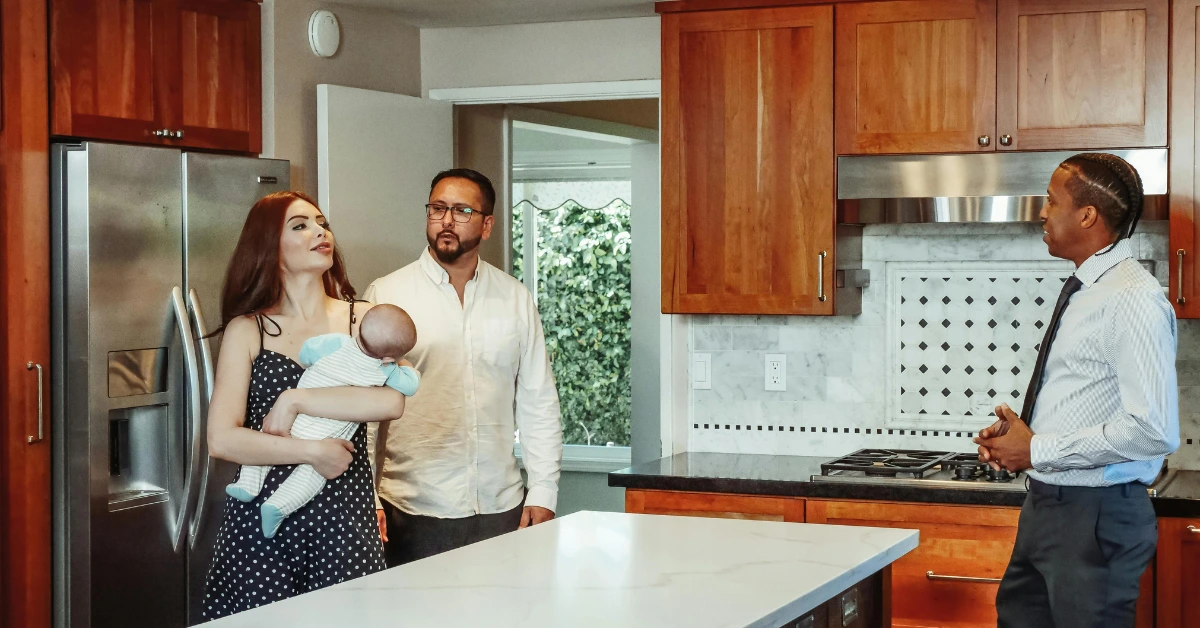Want to find your first rental property?
But maybe you’re worried about making a bad investment or you’re unsure how to even begin. Or perhaps the idea of finding the right property feels overwhelming.
Today, you’ll learn how to build a steady income stream and build wealth over time by finding your first rental property using the same steps I took to build my seven-figure portfolio.
Want to learn more? Then, let’s start!
How to find your first rental property
- Understand your goals
- Educate yourself
- Secure funding
- Choose a location
- Find a property
- Do due diligence
- Make an offer
- Find tenants
- Manage your property
Key takeaways:
- To find and buy your first rental property, take steps such as researching, choosing your ideal tenants, and selecting a good property
- An experienced real estate coach can help you avoid expensive mistakes
- Renting by the room is a highly profitable investment model
Is buying rental property the right choice for you?
Investing in rental property can change your life, but it’s not for everyone. So, before investing, take some time to learn about the risks and benefits involved. Making the right decision now can save you time, money, and headaches later.
Think about it: How will you finance the down payment on your investment property? Do you have a plan in place?
And once you’ve got that property in your hands, how will you market it to attract reliable tenants? What’s your strategy for screening renters so you can avoid costly mistakes?
These aren’t just small details—they’re the make-or-break factors that separate successful investors from the rest.
But here’s the thing: With the right research and preparation, you can feel confident in your decision.
Ready to move forward? Let’s dive into the steps to finding your first rental property.
How to buy your first rental property?
This is the exact step-by-step process I used to successfully find my first rental property—and it’s the same system that can work for you.
Let’s start with setting goals.
1. Set your real estate investment goals
What do you want to achieve with real estate investing? Take a moment to ask yourself two questions:
- What are my short-term goals?
- What’s my long-term vision?
For example, a short-term goal might be buying your first rental property and securing two tenants within a year. These are tangible, actionable steps you can accomplish now.
But what about your long-term vision? Maybe you dream of quitting your 9-to-5 job and living off the income from your properties.
That was my dream, too. When I started investing, my “why” was crystal clear. In the short term, I worked overtime and saved aggressively to make my first down payment. But my bigger vision was retiring early and achieving financial freedom.
Having that goal kept me motivated through the ups and downs. And today? That vision has become my reality.
Your goals are the foundation of your real estate journey. They’re what will guide your decisions and keep you focused, even when challenges arise.
So, take a moment to define your “why.” And then, let’s move on to the next step.

2. Research and educate yourself
When it comes to real estate investing, you need to educate yourself. But how do you get started? There are plenty of ways to learn:
- Read books on investing
- Take courses to deepen your understanding
- Work with an experienced coach or mentor
Here’s my advice: If you want to save both time and money, skip the trial-and-error approach and learn from someone who’s been there.
When I was a new investor, I made my fair share of mistakes. One of the biggest? Buying a 100-year-old house without a proper inspection. Let’s just say the renovation costs were a rude awakening!
Had I worked with an experienced mentor from the start, I could have avoided that mistake.
So, if you’re serious about investing (and don’t want to waste time second-guessing yourself), I offer coaching for complete newbies.
3. Analyze your finances and secure funding
How much can you realistically afford to invest?
If you’re not there yet, don’t worry. Start by setting a clear, achievable budget. Having a target in mind gives you something to work toward.
Once you’ve got a number, it’s time to think about funding. What financing options are available to you? Whether it’s saving for a down payment or exploring mortgage options, this is where your financial plan comes to life.
Need to save faster? Consider ways to boost your income. Here are a few ideas to help you reach your goal:
- Pick up a second job
- Start freelancing in your spare time
- Work overtime (that’s what I did!)
When I was saving for my first down payment, working overtime wasn’t glamorous, but it got the job done. And when I finally made that first investment, it felt incredible knowing all the hard work had paid off.
Once your finances are in order, the next step is just as important: deciding where to invest.
4. Choose your target market and location
Key question: what kinds of renters are you trying to attract?
This is important because it will impact where you should invest. For example, I rent to college students, so I target college towns.
After determining who you’re renting to, think about the:
- Job growth
- Population trends
- And rental demand in the area or areas you’re considering
If you want to rent to working adults, for example, look at high-paying job opportunities in the area, like top hospitals and universities.
Also, think about what type of property you want to invest in, such as:
- Single-family
- Multifamily
- Or condo
No matter what you go with, I recommend choosing houses priced on the low end.
That way, you’ll be able to pay off your mortgage faster and increase your cash flow sooner.
5. Find the right rental property
There are several ways to find good properties, like…
You can also look for off-market deals through wholesalers or direct marketing, for example.
The important thing is not jumping at the first good property you see. There are plenty out there, and it pays to be patient and diligent.
6. Conduct due diligence
Before you buy your first rental property, understand what you’re taking on.
To do that, get the house appraised and inspected. Also, check the property’s history and whether it comes with any legal obstacles, like liens.
The more info you have upfront, the better you’ll be able to make an informed purchasing decision.
After, it’s time to make your offer.
7. Make an offer and close the deal
Once you’ve found the right property, you can make an offer and negotiate terms.
I talk more about this here:
To negotiate successfully, find out what the current real estate market is in your area and whether it favors buyers or sellers.
If it’s a buyer’s market, that means you have more negotiating power because there are more properties for sale than buyers.
Once you finalize the paperwork, the property ownership will transfer to you, and you can start looking for your ideal tenants.
8. Find tenants
Depending on your target market, you can use sites like Zillow and Facebook housing groups to find ideal tenants.
Once you have leads, screen them based on things like:
- Credit score
- Proof of income
- And references
Not sure how much rent to charge? Look at similar rentals in the area to get a ballpark estimate.
Pro tip: Check if there are any rent control laws in your city because these can dictate things like how often you can increase your rent.
9. Manage your property
If you want to minimize your involvement in your rental properties, hiring a property manager is an option.
Personally, I do what I call “tenant empowerment,” which saves me a lot of time.
Here’s what that looks like.
Let’s say a common home maintenance issue comes up, like a leak in the sink.
Whenever that happens, my tenants know they can call the plumber directly and have the issue fixed without contacting me first.
This saves everyone time and significantly reduces my day-to-day involvement.

FAQ: How to find your first rental property
How much do you need for your first investment property?
I recommend aiming for a 20% down payment on a property’s purchase price. Why? It helps you pay off your mortgage faster and boosts your cash flow—your ultimate goal as an investor.
When you apply for a mortgage, lenders will check two things:
- Your income stability (consistent earnings).
- Debt-to-income ratio (your mortgage payment should be no more than 50% of your pre-tax income).
These factors play a big role in determining your eligibility, so plan accordingly.
How do you buy a rental property with no money?
You can get started in real estate without a big upfront investment. Here are two proven strategies:
- Partner with someone who has funds. Offer to manage the property in exchange for a share of the profits. This approach works well if you bring skills or time to the table.
- Househack. If you already own a home, rent out part of it—like a room or a basement suite—and use that income to save for your next property.
Both methods are great for beginners looking to build equity with limited cash.
What type of rental property is most profitable?
Profitability depends on factors like your budget, experience, and risk tolerance. For beginners, I recommend starting with single-family homes. Why? They’re easier to manage and attract stable tenants. Plus, if you rent them by the room, you can maximize profitability and generate higher income from the same property.
How do you make money on your first rental property?
Start by knowing your numbers. For example, look at expected cash flow, location, and rental demand in the area. Also, always get properties inspected before buying to reduce your risk.
What makes a good investment property?
Location matters a lot. Make sure to choose a good neighborhood with the kinds of amenities your ideal tenants are looking for, like public transportation, parks, shopping, and more. Also, look at cash flow potential – if a property has a promising price-to-rent ratio and low operating costs, that’s a good sign.
Next steps
And there you have it! Now you know exactly how to find your first rental property.
As you can see, investing in real estate can help you do things like replace your 9-5 income without getting another job.
Sound like something you want?
If you’re ready to get started, find out about my coaching here.


